Readings Newsletter
Become a Readings Member to make your shopping experience even easier.
Sign in or sign up for free!
You’re not far away from qualifying for FREE standard shipping within Australia
You’ve qualified for FREE standard shipping within Australia
The cart is loading…






For centuries, Pharisees have been well known but little understood–due at least in part to their outsized role in the Christian imagination arising from select negative stereotypes based in part on the Gospels. Yet historians see Pharisees as respected teachers and forward-thinking innovators who helped make the Jewish tradition more adaptable to changing circumstances and more egalitarian in practice. Seeking to bridge this gap, the contributors to this volume provide a multidisciplinary appraisal of who the Pharisees actually were, what they believed and taught, and how they have been depicted throughout history. The topics explored within this authoritative resource include: the origins of the Pharisees the meaning of the name Pharisee Pharisaic leniency, relative to the temple priesthood, in judicial matters Pharisaic concerns for the Jewish laity Pharisaic purity practices and why they became popular the varying depictions of Pharisaic practices and beliefs in the New Testament Jesus’s relationship to the Pharisees the apostle Paul and his situation within the Pharisaic tradition the question of continuity between the Pharisaic tradition and Rabbinic Judaism the reception history of the Pharisees, including among the rabbis, the church fathers, Rashi, Maimonides, Luther, and Calvin the failures of past scholarship to deal justly with the Pharisees the representations, both positive and negative, of the Pharisees in art, film, passion plays, and Christian educational resources how Christian leaders can and should address the Pharisees in sermons and in Bible studies Following the exploration of these and other topics by a team of internationally renowned scholars, this volume concludes with an address by Pope Francis on correcting the negative stereotypes of Pharisees that have led to antisemitic prejudices and finding resources that will positively contribute to the relationship between Jews and Christians, in view of an ever more profound and fraternal dialogue.
$9.00 standard shipping within Australia
FREE standard shipping within Australia for orders over $100.00
Express & International shipping calculated at checkout
For centuries, Pharisees have been well known but little understood–due at least in part to their outsized role in the Christian imagination arising from select negative stereotypes based in part on the Gospels. Yet historians see Pharisees as respected teachers and forward-thinking innovators who helped make the Jewish tradition more adaptable to changing circumstances and more egalitarian in practice. Seeking to bridge this gap, the contributors to this volume provide a multidisciplinary appraisal of who the Pharisees actually were, what they believed and taught, and how they have been depicted throughout history. The topics explored within this authoritative resource include: the origins of the Pharisees the meaning of the name Pharisee Pharisaic leniency, relative to the temple priesthood, in judicial matters Pharisaic concerns for the Jewish laity Pharisaic purity practices and why they became popular the varying depictions of Pharisaic practices and beliefs in the New Testament Jesus’s relationship to the Pharisees the apostle Paul and his situation within the Pharisaic tradition the question of continuity between the Pharisaic tradition and Rabbinic Judaism the reception history of the Pharisees, including among the rabbis, the church fathers, Rashi, Maimonides, Luther, and Calvin the failures of past scholarship to deal justly with the Pharisees the representations, both positive and negative, of the Pharisees in art, film, passion plays, and Christian educational resources how Christian leaders can and should address the Pharisees in sermons and in Bible studies Following the exploration of these and other topics by a team of internationally renowned scholars, this volume concludes with an address by Pope Francis on correcting the negative stereotypes of Pharisees that have led to antisemitic prejudices and finding resources that will positively contribute to the relationship between Jews and Christians, in view of an ever more profound and fraternal dialogue.